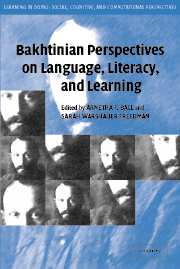Book contents
- Frontmatter
- Contents
- List of Contributors
- Acknowledgments
- PART I IDEOLOGIES IN DIALOGUE: THEORETICAL CONSIDERATIONS
- PART II VOICED, DOUBLE VOICED, AND MULTIVOICED DISCOURSES IN OUR SCHOOLS
- PART III HETEROGLOSSIA IN A CHANGING WORLD
- 9 New Teachers for New Times: The Dialogical Principle in Teaching and Learning Electronically
- 10 Is Contradiction Contrary?
- 11 A Bakhtinian Perspective on Learning to Read and Write Late in Life
- 12 New Times and New Literacies: Themes for a Changing World
- Voices in Dialogue – Hybridity as Literacy, Literacy as Hybridity: Dialogic Responses to a Heteroglossic World
- PART IV A CLOSING THOUGHT ON BAKHTINIAN PERSPECTIVES
- Author Index
- Subject Index
- Titles in the series
- References
Voices in Dialogue – Hybridity as Literacy, Literacy as Hybridity: Dialogic Responses to a Heteroglossic World
Published online by Cambridge University Press: 24 May 2010
- Frontmatter
- Contents
- List of Contributors
- Acknowledgments
- PART I IDEOLOGIES IN DIALOGUE: THEORETICAL CONSIDERATIONS
- PART II VOICED, DOUBLE VOICED, AND MULTIVOICED DISCOURSES IN OUR SCHOOLS
- PART III HETEROGLOSSIA IN A CHANGING WORLD
- 9 New Teachers for New Times: The Dialogical Principle in Teaching and Learning Electronically
- 10 Is Contradiction Contrary?
- 11 A Bakhtinian Perspective on Learning to Read and Write Late in Life
- 12 New Times and New Literacies: Themes for a Changing World
- Voices in Dialogue – Hybridity as Literacy, Literacy as Hybridity: Dialogic Responses to a Heteroglossic World
- PART IV A CLOSING THOUGHT ON BAKHTINIAN PERSPECTIVES
- Author Index
- Subject Index
- Titles in the series
- References
Summary
What is hybridization? A mixture of two social languages within the limits of a single utterance, an encounter, within the arena of an utterance, between two different linguistic consciousnesses, separated from one another by an epoch, by social differentiation, or by some other factor.
– M. M. Bakhtin, (1981, p. 358)Compiling this commentary seemed a unique assignment. True, students are often expected to contrast or critique various ideas, arguments, or literary forms in published works. However, for this commentary, we were asked to relate or otherwise make sense, not of texts seemingly congealed in print, but of exchanges created through an ostensibly more tentative, transitory medium, e-mail. Texts produced for publication are generally expected to be developed, edited, and manicured with great care, but an e-mail may be dashed off with little time devoted to spelling or punctuation, let alone to ideas. Yet, despite such perceptions about print vs. electronic media, the ideas in the e-mails that served as sources for this commentary, e-mails from Gee, Kalman, Mahiri, and Sperling, were both thoughtful and thought provoking. At the same time, the process of reading early versions of the authors' contributions to this volume, posing questions to the authors, and then receiving feedback from them via e-mail highlighted for me both the hybrid and dialogic natures (Bakhtin, 1981), not only of e-mail, but also of the writing process itself (see also Brettschneider, this volume).
- Type
- Chapter
- Information
- Bakhtinian Perspectives on Language, Literacy, and Learning , pp. 307 - 314Publisher: Cambridge University PressPrint publication year: 2004
References
- 4
- Cited by



